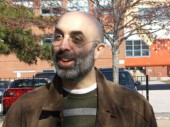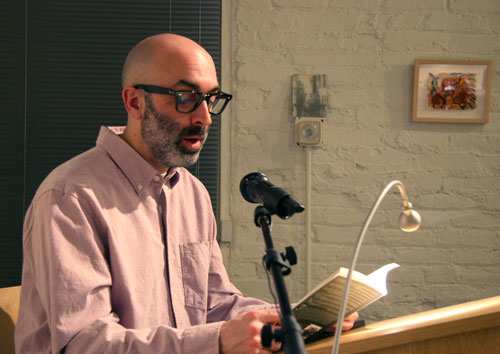Characters who are Looking for their Roots: Q&A with Eduardo Halfon
by Sampsonia Way / March 15, 2013 / No comments
The Guatemalan writer Eduardo Halfon read at City of Asylum/Pittsburgh on February 12. This Q&A, led by the audience, reveals his own story as an author and as the grandson of a man who survived Auschwitz. “The Polish Boxer,” the short story he read, and which provides the name for Halfon’s first novel translated into English, is based on the experience that Halfon’s grandfather shared with him during a six-hour long conversation.
How old were you when your grandfather opened up to you?
It was in my late twenties when he opened up for the first time. This was the fifth book I published in Spanish, so it took me a long time to get to that story. I don’t know if it had something to do with maturing into it, or finding the right angle. I think one of the hardest things for a short story writer is knowing when to get in and when to get out.
Curiously enough, my grandfather spent the next eight or nine years getting worse with the memories. They just flooded him. His last year, it was very bad: He thought there were Germans in the room waiting to take him, or that his mother and father were sitting on the bed. He became delirious with the memories. I don’t know if it was because he had stored them for so long, but when he finally opened up, they just overwhelmed him.
I think that’s something common among people who survive something like that. They have an air of dementia. (Question by Jim Stewart)
That might be. Since then, I’ve been to Poland, and I’ve interviewed many, many more survivors, and there are two groups I see. There are those who need to speak of it and haven’t stopped speaking because they don’t want people to forget. And then the other group, which includes my grandfather, of those who don’t want to acknowledge what happened, and they just bottle it up for years. So what happens when they open that bottle?
- Eduardo Halfon
-

- Eduardo Halfon was born in Guatemala City in 1971. After living in the United States as a child he moved back to Guatemala and served as a professor of literature at the Universidad Francisco Marroquín for eight years. In 2007 the Bogotá Hay Festival listed him as one of the “39 best young Latin American writers.” He now resides in Nebraska.
- His novels include Esto no es ulna pip, Saturno; De cab root; La pirueta; and El boxeador polaco, which is being released in English in October 2012 as The Polish Boxer by Bellevue Literary Press (US) and Puskhin Press (UK).
You may not realize how lucky you are that you were the age you were when your grandfather shared his story with you. A similar story came to me when I was much younger, and in somewhat mythological proportions. I’ve never been able to do anything with it but look back on little bits and pieces that I absorbed. I feel that you were really lucky.
I think so. Perhaps we’re sometimes too close to those stories. If I would have been younger, I would have been blinded by that proximity to my grandfather, with whom I didn’t have a great relationship.
This is a family legacy, and we all have one; the trick, though, is how to express it. I think a lot of it has to do with age and maturity, and not getting there too early, but also not too late, which is what happened with my other grandfather who died when I was very young. Luck has a lot to do with it.
Do you think your grandfather chose you to tell the story for a reason?
I’ve thought of that. I never asked him why he chose me, or why he told it to me. I’ve thought that perhaps, consciously or subconsciously, he wanted somebody to write it down. I was also his eldest grandson.
Had he read any of your other writing?
No, because I hadn’t published anything yet. He also wasn’t a reader. When that book finally was published, my mom read it to him. He never read it himself. He just heard it.
How long after he died did you write “Sunsets,” the last story of the book?
I wrote it pretty quickly. Perhaps a few months after. His deathbed scene is the ending of the book. What I left out of the ending is that, when he died on a Saturday morning, and they couldn’t move him until sunset, I walked in and saw his dead body on the bed, covered up, and my book, his book, El boxeador polaco, was on the night-stand. It was a little too corny to put in the story.
He was so bad the last few years that I don’t think he understood what I did with his story. But he was very proud, I think.
In the story about your grandfather, giving a coin to a guard gets him sent to Auschwitz. Why did that happen to him?
I asked my grandfather about that. He had done this before apparently, given the boss a kickback. For some reason, this particular time it got him sent to Auschwitz, to Block 11, where he met the Polish boxer. But he never told me why that particular time, or why that particular coin, got him into so much trouble. But that coin got him branded; he didn’t have a number before then. He received a number when he got to Auschwitz.
So at the beginning, didn’t you say that you didn’t want this story to be just another Holocaust story? How long did it take for you to find a way to tell the story in a larger context? (Question by Rita Mockus)
There are two answers. The first answer is that I mentioned that story in everything else that I wrote during those years. In the three books that I published before The Polish Boxer, there are references to it. Here’s this story that I’m carrying under my arm, and that I can’t tell.
The second answer is that it took me a long time, seven or eight years. I tried writing it many times. It’s not that I didn’t want to, but I just couldn’t figure out how to do it.
- The Polish Boxer

- -Published on October 12, 2012 by Bellevue Literary Press
- -Halfon’s first novel to be translated to English, it is also being translated into French and German.
- -Translated by Ollie Brock, Lisa Dillman, Thomas Bunstead, Anne McLean, and Daniel Hahn
- -Includes “Sunsets,” a short story which was not included in the Spanish edition.
Were other characters in the book, like the student Juan Kalel in “Distant” or the Serbian pianist in “Epistrophy,” real people? Were you involved with them in the same way as your grandfather’s story?
They’re all real people, but they’re all fiction as well. What’s incredible, and I only realized this once the book was at the publisher’s in Spain, is that all the characters were the same type of person. I’m strongly attracted to people who are looking for their roots.
I was very curious about why you allowed somebody else to translate your Spanish.
For me, language and literature are about music, so my writing style is very lyrical. When you’re translated, there is a problem because it could be a very good, very exact translation but still be missing the music. So the deal was that the five English translators could translate, but I would be the sixth translator. Their words were all fine, but it was an issue about breathing. There has to be a certain rhythm to the way a sentence is written, and the usage of commas is really important. I very rarely say this, but my musical style comes from wanting to be a pianist when I was younger, and not being allowed. I’ve always been very drawn to music. What I write is based on that. Language as music.
The rhythm of English and Spanish are so different, and sometimes there aren’t even words in one language that exist in another. So how do you know the translation is right?
The book is about translation, my grandfather’s words, and the words he didn’t say. The writing process is a translation: I have these images in my head, and I translate them into words. Those words jump from one language to another, and in some cases, I can be involved. In this case I could be involved because it’s in English. Otherwise I have to trust that the publisher chooses the right translator.
You mentioned that it took you time to write these stories. As a writer, at what point are you satisfied with what you’ve written?
That is the hardest question of all. I’ll use a very facile metaphor. There’s this muscle that needs to be developed, that we have atrophied. It is a muscle that discerns whether something we read has it or doesn’t have it, and for those of us who read a lot, we just know it. We can pick up a book, and know within the first few pages whether or not that author has that muscle, or whatever you want to call it, or doesn’t have it. Now to apply that to oneself is the hardest part. When I finish writing something, how do I know if it’s good or not? It’s very hard. It’s more intuitive than mathematical. That’s why I’m very skeptical of creative writing workshops, because you can’t teach that intuition which allows students to know if what they’re writing is worth anything or if they should publish. This statement is very blasphemous. But I’ve taught a lot of workshops.
I thought that you were talking about bringing the rhythm and the flow out?
That is very important and it’s something you can’t add afterwards. Cortázar, another lyrical writer, was very adamant on this point. He said the ultimate test of something he’d written was whether there was music on the page; if there wasn’t, he’d have to start over. He couldn’t infuse music where there wasn’t any. For me, that is one of the gauges of my writing, the rhythm and intensity.
Building on that, did you work with somebody—a workshop, an editor, wife, lover, friend or neighbor—who was narrating for you, or giving you critiques while you were in the process of writing?
That’s a very complicated question because I don’t come from books. I’m an engineer. It used to be I’d never read, ever. I would even get my friends to do my book reports in school. In my late twenties I was back in Guatemala and I barely spoke Spanish. I didn’t know the country, and I didn’t really like being an engineer. Something happened from all of that frustration that led me to books, especially to fiction, but it was accidental.
I enrolled in the university to study philosophy, but in Latin America the degree is a joint degree, of literature and philosophy. They forced me to take a literature course. Something converged then, and I started working part-time as an engineer and would read in the afternoons. The consequence of so much reading was writing. At the beginning of this process, there were two people that I met that helped me find my voice. Both of these people were teachers at the university. One was the best reader I’ve ever met, where language is concerned, but a very bad writer. He helped me become an artisan of language. And the other teacher was a great reader, from an objective point of view. I wanted to learn the craft, and that’s how I began. Now I don’t give what I write to anyone. Once I think it’s ready, my publisher in Spain is my first reader.





